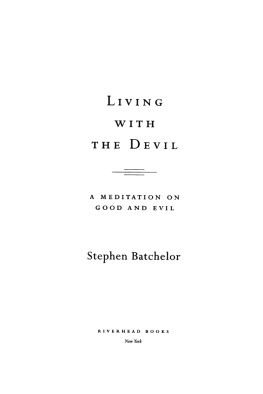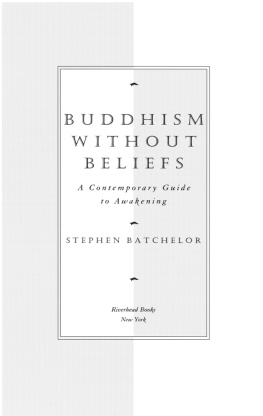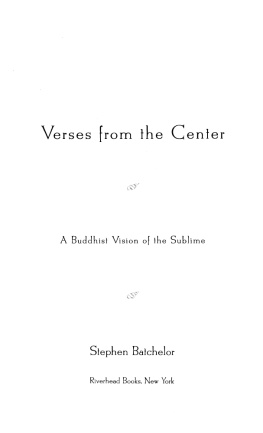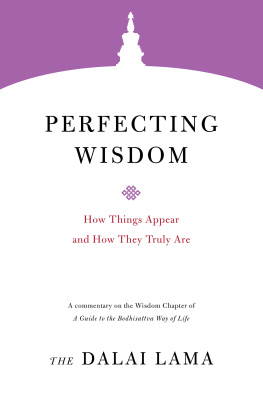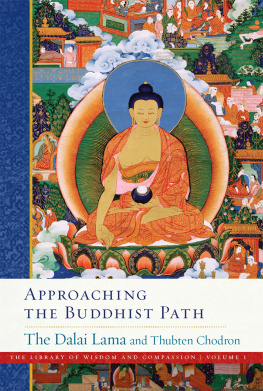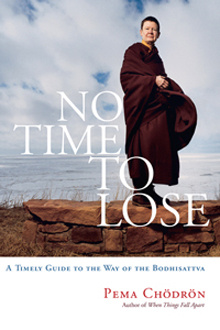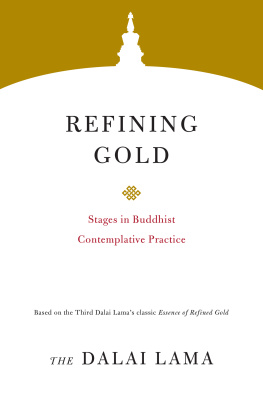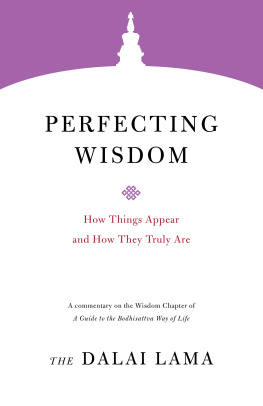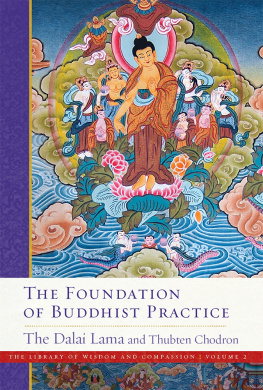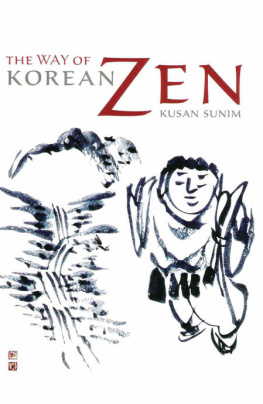THE FAITH TO DOUBT
ALSO BY STEPHEN BATCHELOR
Alone With Others: An Existential Approach to Buddhism
The Tibet Guide
TRANSLATOR
A Guide to the Bodhisattvas Way of Life (Bodhicaryavatara)
Echoes of Voidness
Song of the Profound View
EDITOR
The Way of Korean Zen
The Jewel in the Lotus: A Guide to the Buddhist Traditions of Tibet

Copyright 1990, 2015 by Stephen Batchelor
All rights reserved under International and Pan-American Copyright Conventions.
No part of this book may be used or reproduced in any manner whatsoever without written permission from the publisher, except in the case of brief quotations embodied in critical articles and reviews.
Calligraphy on page 18 by Ven. Kusan Sunim
Designed and typeset by Gopa &Ted2, Inc.
Library of Congress Cataloging-in-Publication Data is available
COUNTERPOINT
2560 Ninth Street, Suite 318
Berkeley, CA 94710
www.counterpointpress.com
Distributed by Publishers Group West
10 9 8 7 6 5 4 3 2 1
e-book ISBN 978-1-61902-636-0
Contents
This twenty-fifth anniversary edition of The Faith to Doubt is a re-issue of the original 1990 Parallax Press text, which has been out of print for some years. Since Korean Buddhism is better known today than it was when the book first appeared, I have decided to change the Japanese term Zen for its Korean equivalent Sn. I have also added an Afterword. Otherwise, the text is identical. I am most grateful to Jack Shoemaker and the staff at Counterpoint Press for making this book available to a new generation of readers.
Stephen Batchelor
Aquitaine, 2014
This short book was started during my stay in Songgwang Sa Monastery, Korea, from 1981 through 1984. It is a collection of essays, quotations, journal entries and stories strung together in an attempt to create a picture of one persons encounter with Zen Buddhism. Although were only written up on my return to England. Thus a varied texture of thoughts and feelings, joys and sorrows, hopes and doubts, introspective reflections and observations of the world, occasional insights and bounteous confusions are spread across these pages.
The Faith to Doubt continues an inquiry that began with my previous book Alone With Others (1983), which arose out of an eight-year training in the Gelugpa school of Tibetan Buddhism. I must emphasize that any reservations I may express in this work about Tibetan Buddhism are conclusions reached in the course of my own particular training and are not intended as a criticism of the Tibetan traditions as a whole, about which I have limited knowledge. There are indeed meditative systems (such as mahamudra and dzog-chen) in Tibetan Buddhism which in many respects .
Likewise, this book is not intended to be a conclusive or a comprehensive account of Zen Buddhism. It too is a personal interpretation, largely informed by the Korean Zen tradition, in particular the branch of that tradition based on the teachings of Chinul. Above all, what I have written here is merely an account of a stage on a longer journey.
I am most grateful to the monks of Songgwang Sa Monastery for putting up with me for nearly four years and providing the peace and quiet needed to meditate, think and write. Since my return to England I have received many helpful criticisms from friends who have read various drafts. In particular I would like to thank Hans Ludin, the late Michael Campbell, Therese Fitzgerald, and Arnie Kotler for their comments. Above all I am indebted to my teacher the late Ven. Kusan Sunim, a true man of Zen. For an authoritative account of Korean Zen Buddhism, the reader is encouraged to read his book The Way of Korean Zen (Weatherhill, 1985).
Stephen Batchelor Vesak, 2532 (1989)
Sharpham, Devon, England
Ah!
The Perfection of Wisdom Discourse in One Letter
For Songil
The way of the Buddha is a living response to a living question. Yet whenever it has become institutionalized its vital response has become a well-formulated answer. The seemingly important task of preserving a particular set of answers often causes the very questions which gave rise to those answers to be forgotten. Then the lucid answers Buddhism provides are cut off from the stammering voice that asks the questions.
The question we ask can only be clumsily phrased in words, for our very existence declares itself to us as a question. Birth, sickness, aging, and death are the mute, imperative voices of this question that beckon us along a path. To be vital, this path can never stray from the ground of its question, it can never rest content with any answer. The path leads not to a coherent answer but to a series of responses as inarticulate as the question.
Once we find something to believe in, it is easy to forget the original question. But instead of acquiescing in the security of belief, we can intensify the sense of doubt. Belief, whether in a teacher, a doctrine, or even ones own experience, retreats from the questions behind a shield of protective views and concepts. But the person who questions lies open and exposed, prepared for the unpredictability of the moment.
Such questioning is not restricted to intellectual inquiry but engages the whole of our body and mind. You must concentrate day and night, urges the Gateless Gate, questioning yourself through every one of your 360 bones and 84,000 pores.
That we are here at all is utterly uncanny yet remarkably ordinary. Our response to this paradox is the doubt that probes the mystery of which our minds are the insignificant center. Such doubt is a response that leads not to further knowledge about any particular thing but to wisdom of the whole.
How easy it is to lose ourselves in fascination with the uncanny and forget the ordinariness of it all! The daily life that goes on around us is calling for a response. The shining, inscrutable look in anothers eyes beckons us along a path. Animals, birds, trees, grasses, rivers, and stones each call to us in their own mute voices. Good snowflakesthey dont fall in any other place! said Layman Pang. Each moment a fresh and manifold situation is given to us but how often do we retreat from it? How clearly do we listen to and heed its call?
Chandrakirti describes how the joy the bodhisattva experiences upon responding to a call for help is not found even by the sage absorbed in the peace of nirvana. Such a response is rooted in the heightened sense of interconnectedness with all that lives. It springs from the awareness that we are not alone, reflecting the inescapable responsibility each part of life bears towards the whole.
The way of the Buddha teaches the union of wisdom and compassion (corresponding to the paradoxical unity of mysterious emptiness and vivid appearances) as the most appropriate response to life. But this response is not apart from life. It has its roots in the very questions that existence poses, just as the lotus that emerges unstained by the mud out of which it grows.
The form Buddhism assumes is likewise a response to the situation in which it finds itself. No one can dictate or predict such a form; for it comes into being independent of any individuals design. Each cultural and historical occasion is a unique question that provokes a unique response. All we can do is to keep to the path that beckons. For us, there is only the trying, the rest is not our business.
Next page


